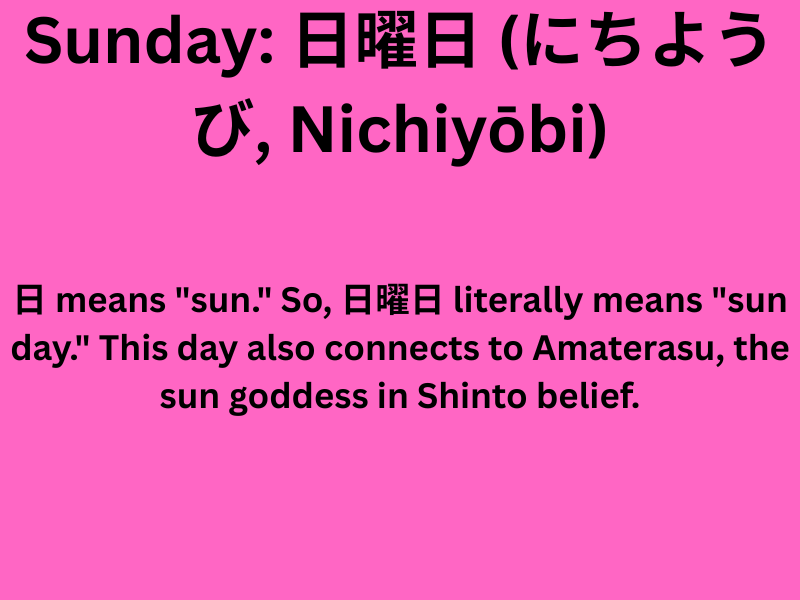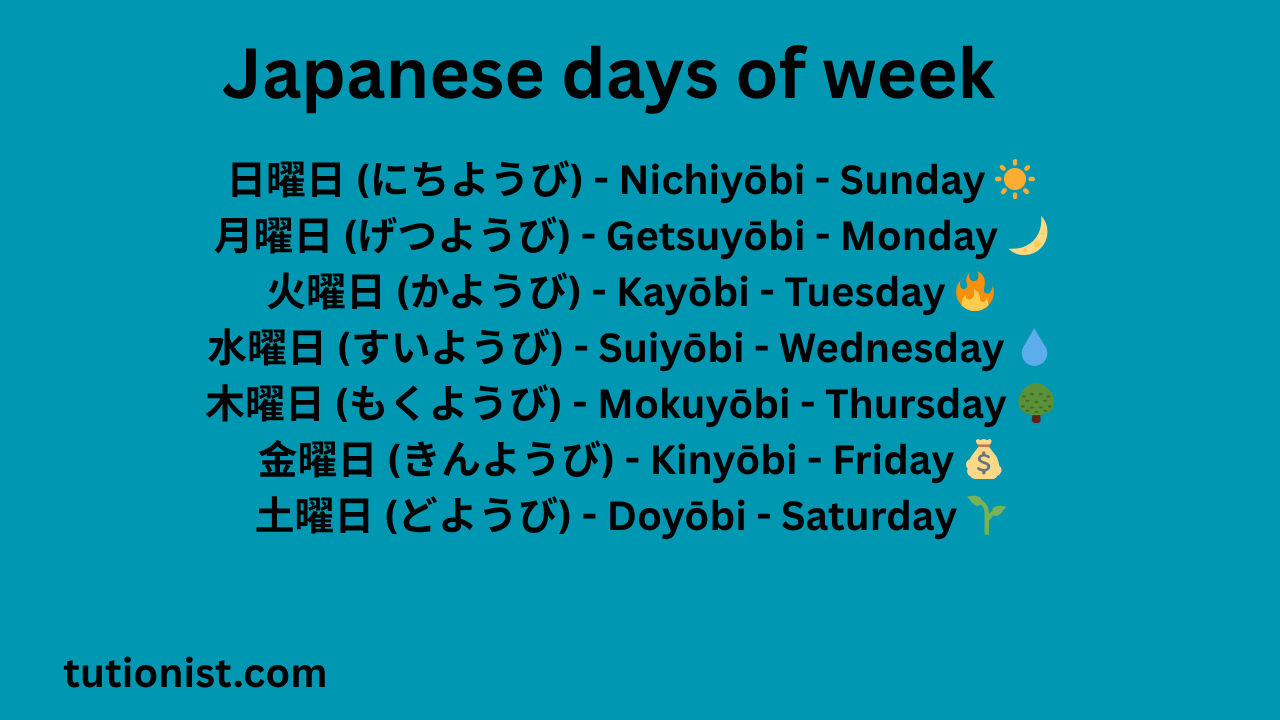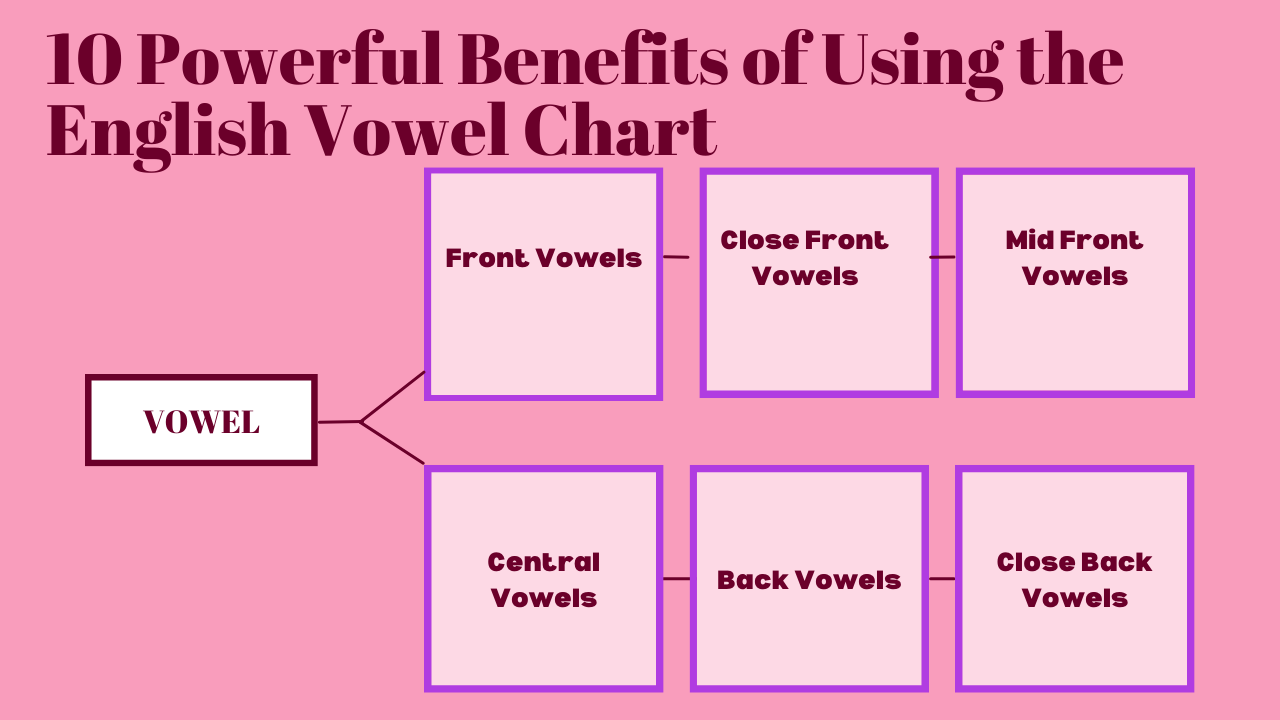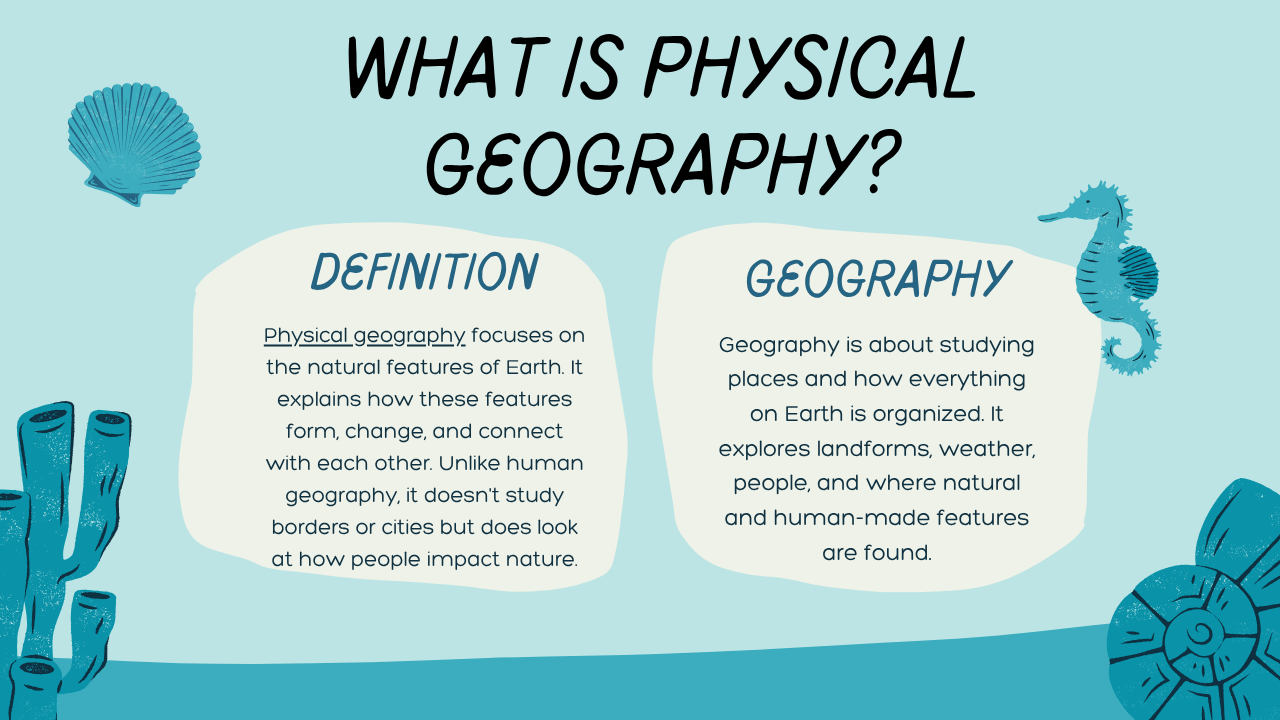Learning the Japanese days of week might sound tough at first, especially with all the kanji involved. But the good news is, once you understand the pattern, it’s actually simple and logical. All seven days end in “ようび” (youbi), which basically means “day of the week.”
Each day starts with a unique kanji that represents elements like fire, water, or the moon. These are easy to recognize with just a little practice. Just like in English, the days go from Monday to Sunday, and the structure stays consistent.
Whether you’re scheduling a meeting or booking a trip in Japan, knowing the Japanese days of week will definitely come in handy. Stick with this guide, and you’ll be reading calendars like a local.
How to Say Japanese days of week?
The Japanese days of the week follow a pattern that’s easy to pick up once you see the logic behind it. Monday is getsuyōbi (月曜日), Tuesday is kayōbi (火曜日), Wednesday is suiyōbi (水曜日), Thursday is mokuyōbi (木曜日), Friday is kin’yōbi (金曜日), Saturday is doyōbi (土曜日), and Sunday is nichiyōbi (日曜日). Each name ends in “yōbi”, which means “day of the week”, while the first part comes from nature or celestial elements like the moon, fire, water, and the sun—giving each day a unique meaning rooted in tradition.
The Story Behind Japanese Weekday Names: Nature, Planets, and Meaning
Let’s break it down and explore where each Japanese days of week name really comes from. Like many other languages, Japanese names for the days of the week are tied to astronomy and mythology — and they trace all the way back to ancient China. The key part here is the character 曜 (よう, yō), which hints at their origin. In Chinese, this character refers to something that shines — like a celestial body. Think of the sun, the moon, and the five planets you can see without a telescope: Mercury, Venus, Mars, Jupiter, and Saturn. These are known as the “seven luminaries,” and they’re the reason we have seven days — each one linked to a different one of these glowing giants in the sky.
Sunday: 日曜日 (にちようび, Nichiyōbi)

日 means “sun.” So, 日曜日 literally means “sun day.” This day also connects to Amaterasu, the sun goddess in Shinto belief.
Monday: 月曜日 (げつようび, Getsuyōbi)
月 stands for “moon.” Like in many other cultures, the moon is linked with Monday in Japanese as well.
Tuesday: 火曜日 (かようび, Kayōbi)
火 means “fire.” This day is tied to Mars, often called the “Fire Star” in old Japanese astronomy because of its red glow.
Wednesday: 水曜日 (すいようび, Suiyōbi)
水 means “water.” It represents Mercury, known as the “Water Star.”
Thursday: 木曜日 (もくようび, Mokuyōbi)
木 means “wood” or “tree.” This refers to Jupiter, which was considered the “Wood Star,” symbolizing growth.
Friday: 金曜日 (きんようび, Kinyōbi)
金 stands for “gold” or “metal.” It connects to Venus, called the “Metal Star” in old astronomy.
Saturday: 土曜日 (どようび, Doyōbi)
土 means “earth.” This day is related to Saturn, also known as the “Earth Star.”
| How to Talk About Your Week Like a Native Speaker |
今日 (きょう, kyō) – Today
昨日 (きのう, kinō) – Yesterday
一昨日 (おととい, ototoi) – The day before yesterday
明日 (あした, ashita) – Tomorrow
明後日 (あさって, asatte) – The day after tomorrow
この間 (このあいだ, kono aida) – The other day / A few days ago
平日 (へいじつ, heijitsu) – Weekday
週末 (しゅうまつ, shūmatsu) – Weekend
Talking Naturally with Days of the Week in Japanese
Once you get the hang of the Japanese days of the week, you’ll see them used in lots of everyday phrases. Here are a few useful ones to help you sound more natural in conversations:
- 月曜日から金曜日まで (Getsuyōbi kara Kinyōbi made)
- “From Monday to Friday”
- This is a helpful phrase when talking about your work or school week.
- 金曜日の夜は何をしますか? (Kinyōbi no yoru wa nani o shimasu ka?)
- “What are you doing Friday night?”
- Perfect for making weekend plans or chatting with friends.
- 日曜の憂鬱 (Nichiyō no yūutsu)
- “The Sunday blues”
- This describes the feeling of stress or sadness that comes when the weekend ends and Monday is just around the corner.
Using these simple phrases can help you feel more confident and make your Japanese sound more natural and real.
Sure! Here’s a unique and well-organized table showing how Japanese days of week connects to a natural element:
| Kanji | Pronunciation | Meaning (Element) | Associated Day |
|---|---|---|---|
| 日 | nichi | Sun | Sunday (Nichiyōbi) |
| 月 | getsu | Moon | Monday (Getsuyōbi) |
| 火 | ka | Fire | Tuesday (Kayōbi) |
| 水 | sui | Water | Wednesday (Suiyōbi) |
| 木 | moku | Wood/Tree | Thursday (Mokuyōbi) |
| 金 | kin | Gold/Metal | Friday (Kinyōbi) |
| 土 | do | Earth | Saturday (Doyōbi) |
This connection to the natural elements makes learning Japanese weekdays both interesting and memorable!
Learning the Japanese days of week might sound tough at first, especially with all the kanji involved. But the good news is, once you understand the pattern, it’s actually simple and logical. All seven days end in “ようび” (youbi), which basically means “day of the week.”
Each day starts with a unique kanji that represents elements like fire, water, or the moon. These are easy to recognize with just a little practice. Just like in English, the days go from Monday to Sunday, and the structure stays consistent.
Whether you’re scheduling a meeting or booking a trip in Japan, knowing the Japanese days of week will definitely come in handy. Stick with this guide, and you’ll be reading calendars like a local.
How to Say Japanese days of week?
The Japanese days of the week follow a pattern that’s easy to pick up once you see the logic behind it. Monday is getsuyōbi (月曜日), Tuesday is kayōbi (火曜日), Wednesday is suiyōbi (水曜日), Thursday is mokuyōbi (木曜日), Friday is kin’yōbi (金曜日), Saturday is doyōbi (土曜日), and Sunday is nichiyōbi (日曜日). Each name ends in “yōbi”, which means “day of the week”, while the first part comes from nature or celestial elements like the moon, fire, water, and the sun—giving each day a unique meaning rooted in tradition.
The Story Behind Japanese Weekday Names: Nature, Planets, and Meaning
The Japanese days of the week aren’t just arbitrary names—they’re a fascinating blend of ancient astronomy, mythology, and cultural exchange rooted in China’s “seven luminaries” (七曜, shichiyō). At the heart of this system lies the kanji 曜 (yō), meaning “to shine”—a nod to the celestial bodies that inspired each Japanese days of week:
- Sun (日) → Sunday (Nichiyōbi) – Linked to Amaterasu, Japan’s sun goddess.
- Moon (月) → Monday (Getsuyōbi) – A global pattern (think “Monday = Moon-day”).
- Fire (火) → Tuesday (Kayōbi) – Tied to Mars, the “fire star” in East Asian astrology.
- Water (水) → Wednesday (Suiyōbi) – Represents Mercury, the “water star.”
- Wood (木) → Thursday (Mokuyōbi) – Symbolizes Jupiter’s growth energy.
- Metal (金) → Friday (Kinyōbi) – Connects to Venus’s radiant beauty.
- Earth (土) → Saturday (Doyōbi) – Reflects Saturn’s grounding influence.
This system, imported from Tang Dynasty China over 1,200 years ago, shows how Japan merged science and spirituality into everyday language. Today, these names remind us that the Japanese weekdays are more than timekeepers—they’re a cosmic code waiting to be decoded!
Sunday: 日曜日 (にちようび, Nichiyōbi)
日 means “sun.” So, 日曜日 literally means “sun day.” This day also connects to Amaterasu, the sun goddess in Shinto belief.
Monday: 月曜日 (げつようび, Getsuyōbi)
月 stands for “moon.” Like in many other cultures, the moon is linked with Monday in Japanese as well.
Tuesday: 火曜日 (かようび, Kayōbi)
火 means “fire.” This day is tied to Mars, often called the “Fire Star” in old Japanese astronomy because of its red glow.
Wednesday: 水曜日 (すいようび, Suiyōbi)
水 means “water.” It represents Mercury, known as the “Water Star.”
Thursday: 木曜日 (もくようび, Mokuyōbi)
木 means “wood” or “tree.” This refers to Jupiter, which was considered the “Wood Star,” symbolizing growth.
Friday: 金曜日 (きんようび, Kinyōbi)
金 stands for “gold” or “metal.” It connects to Venus, called the “Metal Star” in old astronomy.
Saturday: 土曜日 (どようび, Doyōbi)
土 means “earth.” This day is related to Saturn, also known as the “Earth Star.”
How to Talk About Your Week Like a Native Speaker
今日 (きょう, kyō) – Today
昨日 (きのう, kinō) – Yesterday
一昨日 (おととい, ototoi) – The day before yesterday
明日 (あした, ashita) – Tomorrow
明後日 (あさって, asatte) – The day after tomorrow
この間 (このあいだ, kono aida) – The other day / A few days ago
平日 (へいじつ, heijitsu) – Weekday
週末 (しゅうまつ, shūmatsu) – Weekend
Everyday Phrases with Japanese Weekday Names
Talking Naturally with Days of the Week in Japanese
Once you get the hang of the Japanese days of the week, you’ll see them used in lots of everyday phrases. Here are a few useful ones to help you sound more natural in conversations:
- 月曜日から金曜日まで (Getsuyōbi kara Kinyōbi made)
- “From Monday to Friday”
- This is a helpful phrase when talking about your work or school week.
- 金曜日の夜は何をしますか? (Kinyōbi no yoru wa nani o shimasu ka?)
- “What are you doing Friday night?”
- Perfect for making weekend plans or chatting with friends.
- 日曜の憂鬱 (Nichiyō no yūutsu)
- “The Sunday blues”
- This describes the feeling of stress or sadness that comes when the weekend ends and Monday is just around the corner.
Using these simple phrases can help you feel more confident and make your Japanese sound more natural and real.
Sure! Here’s a unique and well-organized table showing how each day of the week in Japanese connects to a natural element:
| Kanji | Pronunciation | Meaning (Element) | Associated Day |
|---|---|---|---|
| 日 | nichi | Sun | Sunday (Nichiyōbi) |
| 月 | getsu | Moon | Monday (Getsuyōbi) |
| 火 | ka | Fire | Tuesday (Kayōbi) |
| 水 | sui | Water | Wednesday (Suiyōbi) |
| 木 | moku | Wood/Tree | Thursday (Mokuyōbi) |
| 金 | kin | Gold/Metal | Friday (Kinyōbi) |
| 土 | do | Earth | Saturday (Doyōbi) |
This connection to the natural elements makes learning Japanese weekdays both interesting and memorable!

Conclusion:
Mastering the Japanese days of the week—Nichiyōbi (Sunday), Getsuyōbi (Monday), Kayōbi (Tuesday), Suiyōbi (Wednesday), Mokuyōbi (Thursday), Kinyōbi (Friday), and Doyōbi (Saturday)—is easier once you understand their elemental meanings and celestial origins. Each day’s kanji connects to nature (sun, moon, fire, water, etc.) and ancient Chinese astronomy, making them logical and memorable.
With this guide, you’ve learned:
✔️ Japanese day names with English equivalents
✔️ The cultural significance behind each kanji
✔️ Practical phrases for daily conversations
Now you’re ready to schedule plans, read calendars, and speak naturally about dates in Japanese! Keep practicing, and soon the Japanese days of the week will feel like second nature.







